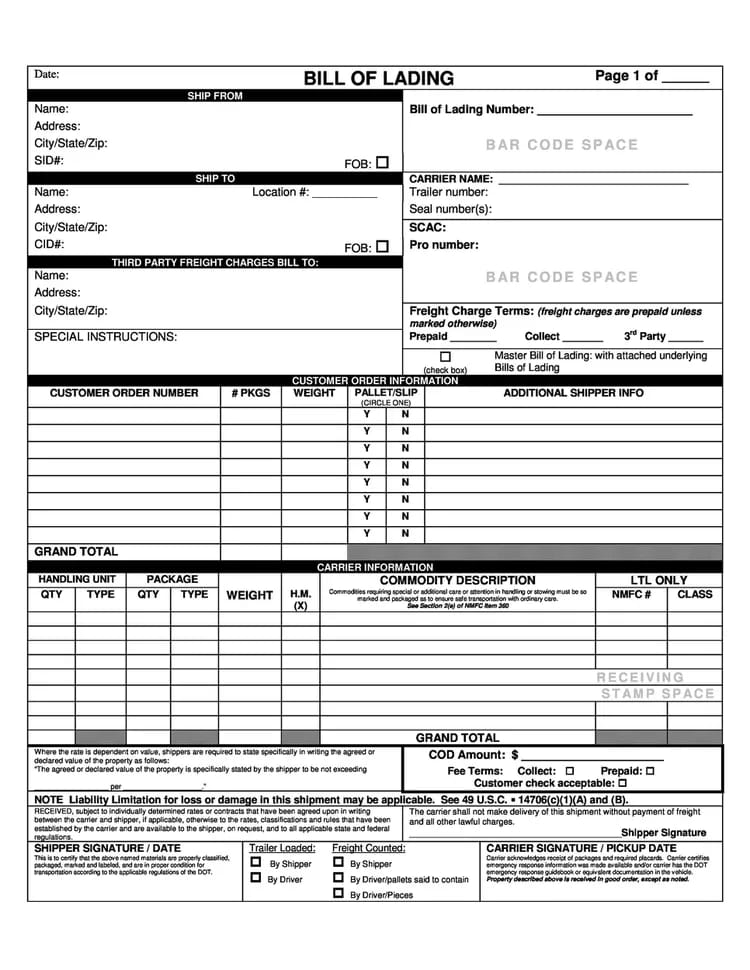🚢 Why This Document is Important in International Shipping
When you buy or sell products across countries, goods are often moved by ship, air, or road. But how do you prove what’s being shipped, who owns it, and who should receive it?
That’s where the Bill of Lading (often called BoL) comes in.
Think of the Bill of Lading like a passport for your goods. It tells the shipping company everything they need to know about your cargo — and makes sure your shipment is handled correctly.
What is a Bill of Lading (BoL)?
A Bill of Lading is a document given by the shipping company (Carrier) to the exporter (Shipper) when goods are picked up for delivery.
It works like:
✅ A receipt for the goods
✅ A legal agreement between shipper and carrier
✅ A proof of ownership of the goods
Disclaimer: This is a reference format only. The structure and content may change depending on the carrier, cargo type, and trade agreement.

Why is the Bill of Lading Important?
-
Proof that goods were sent
It shows what products were shipped and in what condition. -
It gives ownership rights
Only the person who holds the original BoL can claim the goods at the destination. -
Used in payment process
The exporter can hold the BoL until the buyer makes payment. This keeps the deal safe. -
Needed for customs
Countries require this document to allow goods to enter or leave.
What Information is in a Bill of Lading?
A BoL usually includes:
- Who is sending the goods (Shipper)
- Who is receiving the goods (Consignee)
- Who to notify when the goods arrive (Notify Party)
- Type and quantity of goods
- Port of loading and unloading
- Container and seal numbers
- Shipping company name and logo
- Payment terms (Freight Prepaid or Freight Collect)
What Do Freight Prepaid & Freight Collect Mean?
- Freight Prepaid: The shipper pays shipping charges in advance.
- Freight Collect: The receiver (buyer) pays when goods arrive.
💡 Note: The shipping company won't release goods unless someone pays these charges.
Types of Bill of Lading
There are different types of BoL based on how and to whom the goods are delivered:
- Straight BoL – Goods are delivered only to the person named on the BoL
- Order BoL – Can be transferred to another person by signing on the back
- Surrender BoL – Allows the shipment to be released without showing a paper copy
- House BoL – Issued by freight forwarders (agents who manage your shipment)
- Master BoL – Issued by the actual shipping company
How is a Bill of Lading Created?
At Hoysala International Growth Hub (H.I.G.H), we simplify the export process. But if you want to know how it's usually done:
- The exporter fills shipment details on a platform (like IncoDocs).
- The shipping company checks and signs it.
- It is sealed, shared as PDF or print.
- It travels with the goods or is shared electronically.
- The importer shows it to receive the goods.
⚠️ What Happens if You File It Late?
If your shipment is going to countries like the USA, there are rules like ISF filing. If your Bill of Lading is late:
- You may face penalties up to $5,000 or more
- Your goods can be held at port or delayed
- You might need to pay extra customs duties or fines
Avoid this by working with trusted exporters like H.I.G.H or using smart logistics tools.
Why Work with Hoysala International Growth Hub?
✅ We handle all international documentation
✅ We work with trusted shipping agents & freight forwarders
✅ We support small businesses, farmers, and new exporters
✅ We are 100% committed to "Make in India, Sell to the World"
What is a Bill of Lading? A Beginner’s Guide to This Must-Know Shipping Document Published by: Hoysala International Growth Hub (HIGH) – Your Gateway to Global Trade